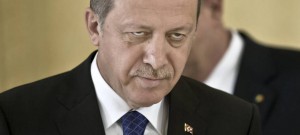Turkish President Recep Tayyip Erdoğan on Monday (5 October) urged the EU to train rebels, and to consider a no-fly zone and safe haven area in Syria, during talks to address Europe’s growing migrant crisis.
Speaking after the discussions in Brussels, Erdoğan said Turkey was bearing the brunt of the crisis, and pressed the bloc to act against “state-sponsored terrorism” in its war-torn neighbour.
In a high-profile trip that was overshadowed by Russia’s incursions into Turkey’s airspace near Syria, Erdoğan sought to shift the focus onto what he sees as Europe’s failure to take in more refugees, and intervene in the Syrian civil war.
“The root cause of the refugee crisis today is the war in Syria,” Erdogan told reporters following a series of meetings in Brussels with top EU officials. He called on the EU to do more to train rebels, set up a protected zone inside northern Syria, and enforce a no-fly zone to Assad’s aerial attacks on civilians.
The European Union, meanwhile, said Turkey must do more to stop the flow of hundreds of thousands of refugees who have landed on its shores in the worst such crisis since World War II.
“It is indisputable that Europe has to manage its borders better. We expect Turkey to do the same,” EU President Donald Tusk told reporters.
Erdoğan met separately with Parliament President Martin Schulz, with Council President Donald Tusk, and Commission President Jean Claude Juncker, and attended a dinner with the three, hosted by Tusk.
Turkey has become a key smuggling route for thousands of migrants seeking a better life in the EU – some 630,000 people have entered the bloc illegally this year – many of them fleeing fighting in Syria and Afghanistan.
Most are headed for the wealthier countries of northern Europe and Germany, which has welcomed the refugees, and now predicts it could receive up to 1.5 million asylum seekers in 2015.
Thousands took to the streets of the eastern city of Dresden late Monday, accusing Chancellor Angela Merkel of “crimes against the German people” and “treason”.
“It won’t stop with 1.5 or two million,” said Lutz Bachmann, co-founder of the anti-Islamic PEGIDA movement that organised the march.
“They will have their wives come, and one, two, three children. It is an impossible task to integrate these people,” he told the protesters.
On 2 October, Bachmann was charged with inciting hatred by German prosecutors, having referred to migrants as “filth” and “cattle”.
‘Safe zone’
The Syrian crisis has forced Ankara and Brussels to engage in diplomacy despite strains over EU criticisms of Turkey’s human rights record, and tortuous negotiations on its application for membership of the bloc.
Speaking in Brussels during a trip that has been overshadowed by rising tensions with Russia over its air strikes in Syria, Erdoğan urged the EU to do more to topple Syrian President Bashar al-Assad.
The “root cause” of the refugee crisis was the “state-sponsored terrorism actually carried out by Assad himself”, Erdoğan said, stating that three things need to be done to end the crisis.
“One is to focus on training and equipment, the second one is to declare a safe zone that would be protected from terrorism, and the third is a no-fly zone,” Erdoğan said.
Western officials had previously cast doubt on the Turkish proposals for a no-fly “safe zone” in northern Syria, where refugees could take shelter from the bloody conflict.
Brussels and Ankara also are reported to have discussed a European Commission plan that would see Turkey join Greek coastguard patrols in the eastern Aegean, coordinated by EU border agency Frontex.
Any migrants picked up would be taken back to Turkey, where six new camps for up to two million people would be built, co-financed by the EU.
Erdogan reportedly agreed for the first time to discuss the issue of more migrant camps, according to EU diplomats briefed on the meeting, who described it as a breakthrough.
That should mean setting up a high-level working group to discuss migration in return for speeding up talks on visa-free travel for Turks in Europe.
Turkish Prime Minister Ahmet Davutoğlu has previously rejected an EU plan to set up “hotspots” on Turkish soil to register asylum seekers, saying that Turkey was not prepared to be a “concentration camp” for refugees.
People-smuggling scourge
Europe has also been pressuring his government to do more to tackle the 30,000 people smugglers it estimates are operating in Turkey.
Highlighting the scourge, Italy’s coastguard said that more than 1,800 migrants were rescued Monday from six vessels found adrift in the Mediterranean, and the Red Crescent said that the bodies of 85 migrants had been found washed ashore in Libya.
In Greece, police arrested an Afghan smuggler accused of keeping 34 migrants, including 12 minors, locked up in an Athens apartment.
Frontex chief Fabrice Leggeri said 630,000 people had entered the bloc illegally this year and called for 775 extra border guards to be deployed at the EU’s external borders.
The Czech Republic said it would send “about 25 soldiers” to neighbouring Hungary to help it protect the EU’s external frontiers.
The EU said last month that it was setting up a 1.8-billion-euro ($2 billion) fund to help curb the inflow from African countries, which includes many economic migrants as well as those fleeing conflict and persecution.
Most of those seeking a better life in Europe are from the Middle East and Africa, and African and EU leaders will discuss the migration crisis at a summit in Malta next month.
French President François Hollande and AU chief Nkosazana Dlamini-Zuma said on Monday that they wanted the summit to tackle the causes behind the mass movement, including poverty, education and youth unemployment.
“There are no barriers that can stop people. We need to address the realities on the ground in our countries,” said Dlamini-Zuma.



